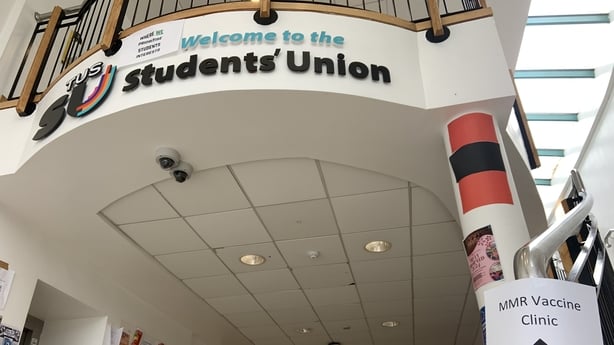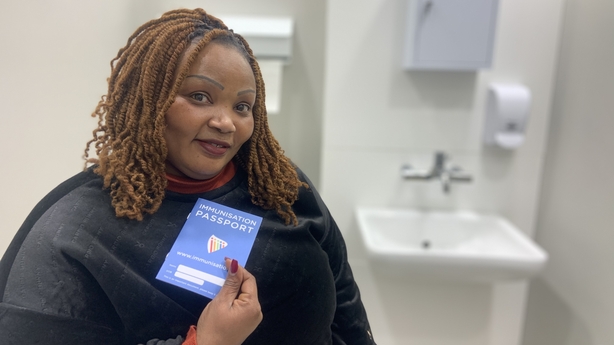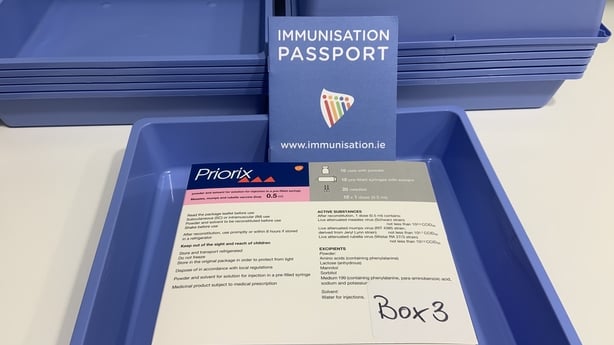A student health initiative is under way in the midlands to protect students against measles.
HSE staff arrived to deliver an MMR vaccine clinic for students and staff at the Technological University of the Shannon.
Student Health Nurse on campus Laura Tully said it was a really important clinic because it was going to offer protection against measles, mumps and rubella.
"We're concerned at the moment because there's a really large outbreak of measles across the UK and Europe, and we had unfortunately a recent death in the midlands here attributed to measles.
"We want to protect our students. We want to protect those that are not fully vaccinated by offering them a free vaccine on campus here."
Ms Tully said they had to promote the vaccine and educate students about the disease as it had not been on their radar.
"Measles wouldn't have been a common illness. Unfortunately, it's now making a resurgence because people didn't get the vaccinations.

"In order for a disease to be suppressed and not become a threat, we need large numbers of the population to be vaccinated."
The health team on campus is working with students to try and improve their knowledge about measles.
They have been trying to reach them through social media, student emails and awareness campaigns on campus.
"In terms of students and risk, this age group, predominantly 18-24 year olds, there are very high numbers unvaccinated in this age group, probably something like 11% are unvaccinated.
"If you think about how students work, live and study, it’s generally a lot of close contact mixing, living in close quarters and socialising. So they’re a real target group for us to protect and so we can avoid a measles outbreak."
Ms Tully said they also been trying to educate students around the importance of protecting not just themselves but their community and other vulnerable people.
"One of the ways that we're engaging with the students is educating them around the implications and complications of measles.
"So if they're exposed to somebody with measles and they’re unvaccinated, they're going to be out of action from work, study, maybe even exams, for up to three weeks."
Ms Tully said they have been seeing a good uptake and interest in the vaccine that was offered on campus this morning and again tomorrow morning.
She said they were trying to reach their overseas students in particular, as they have a very diverse population in the technological university.
"Measles, mumps and rubella wouldn't be endemic to some countries where our students have travelled from, or the vaccine may not be available in those countries."
Nana Abena Amankwa, a 39-year-old student from Ghana said she came to the clinic to protect herself.
She said she only had one dose of the MMR vaccine when she was in Ghana and she has concerns about catching measles.
"I'm afraid, that's why I came to take the vaccine so that I can protect myself.
"I’ve done it once when I was in Ghana so I find it advantageous to do it again as I’m in the college."
Ms Amankwa who is studying to become a social care worker commutes from Dublin every day.
She said it is difficult to get a GP appointment to suit her as she is driving for one and a half hours each way, then sitting in classes for around eight hours most days.
She said was not aware there was a health service on campus until she received the email that was sent to all students to inform them that the clinic would be offering the vaccine.

"I think they have done a great job offering this vaccination service because I am travelling from Dublin each day to Athlone and then it’s difficult to get it done in Dublin.
"It’s a good thing they have brought the vaccines and it’s a good thing for students to take the vaccine in the campus."
Evelyn Phelan, HSE clinical lead in the Laois, Offaly, Westmeath and Longford vaccination base, said as well as offering the vaccine, they are there to answer any questions students or staff have on whether they are eligible to receive this dose of MMR vaccine.
"We’re meeting all sorts of scenarios which is great. We have a lot of students who have shown up who may have received their first dose before the age of 12 months in their country of origin which would not be counted as a dose on our HSE schedule, so we would provide a dose today if they wished to proceed."
Ms Phelan said they can also offer advice to people who do not have any vaccination records or are unsure of their vaccination history.
"We can go on the World Health Organization website and check for their country. There we can find a list of vaccinations for their country and the ages that were given."
The clinic is running on campus again tomorrow morning for students and staff.

Anyone born after 1978 who has not been vaccinated is welcome to attend the clinic, according to Ms Tully.
"We’re trying to capture everyone we can here again tomorrow and if there's continued interest in uptake, we'd be able to run more clinics after that," she said.
MMR vaccines to be made available at third-level colleges
In a statement, the HSE said MMR vaccines are being made available at third-level colleges from this week.
It said details of these clinics are being communicated directly with the student bodies at each location and they would encourage anyone studying or working at these sites, who has an opportunity to avail of this vaccine to do so.
There is also a free catch-up MMR option via participating GPs for those who may have missed their vaccination when younger.
As part of the broader programme appointments will also be available through HSE clinics for certain cohorts.
The programme, expected to begin next week, will prioritise the following groups as uptake rates are currently lower.
- Children and young adults
- Healthcare workers
- Under-served groups such as refugees, applicants seeking protection and the homeless community.







